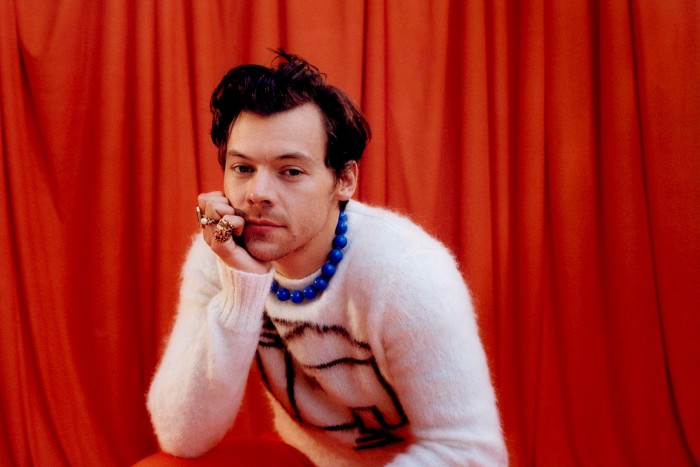
Is Harry Styles the perfect pop star? With the release of his third solo album Harry’s House on Friday, he has shaken off any vestige of the pop poppet-ry that has dogged his reputation and assumed his position as a legitimate rock star. But that’s not my opinion — I’ve only heard the single “As It Was”, a bittersweet meditation on personal evolution which entered the Guinness Book of Records as the most streamed track by a male artist on Spotify in 24 hours and has spent six weeks at the top of the UK charts. It’s the critics who’ve gone wild. Mostly male, mostly white and often joyless, the music press who got an early preview of the album have been lining up to lavish Styles with praise. The Guardian’s Alexis Petridis described Harry’s House as “extremely well turned out, ticks a lot of the right boxes and has abundant charm”. Zane Lowe, whom you can see pawing Styles with fanboy adulation in an extended interview on YouTube, calls Harry’s House a “triumph”. Rolling Stone has described Styles as “Mick Jagger for our more enlightened age”.
“Everyone is changing,” says Styles to Lowe about his musical evolution, and certainly the 28-year-old from Cheshire has come a long way since wrapping a droopy scarf around his neck for an audition, and coming third on a reality show conceived by Simon Cowell. One Direction, the five-piece band of teenagers into which Styles was late enlisted, were arguably the last expression of a traditional manufactured boy band before K-Pop, the phenomenon of YouTube and social media enabled artists to emerge outside the traditional sausage-factory of the svengali-managed world. But while One Direction were always madly popular, in our house at least where we have always been Team Harry, no one ever gave much credence to their musical legitimacy.

“They’re no Beatles, obviously,” observed Alexa Chung of their contribution when I interviewed the band for a Vogue story in 2012. “But it’s nice to see a boy band dress well for a change.”
On that distant afternoon 10 years ago, I still remember Styles as being the special one. I remember him being the only band member to introduce himself to every member of the production team, from photographer to shoe-tyer, and how scrupulously polite he was. He seemed unfazed by the giddy energy of mega-fandom, or the growing hordes of screaming girls who were queueing on the road outside: “I enjoy it,” he shrugged about the relentless diary schedule. “Especially where you don’t have to just sit there and grin.”
That the critics are surprised that Styles has managed to accomplish the transition from teeny pop idol to mature artist suggests they weren’t paying attention all those years ago. Styles was always in it for the long game: he’s got a great voice, he’s always been kind and courteous in public, he’s mad ambitious. And he’s still got that lovely head of hair.

Styles’s success has been built on his personality, his awesome team of producers, and the fact that he can sing. But his trajectory has also coincided with a period in which the defining characteristics of the pop star have been more malleable than before. As a young and fruity-looking teenager, Styles might have embraced the uber-sexuality of rock-star fame: he might have followed Jagger, or Timberlake (another successful boy band alumnus) and carved a career based on highly heteronormative performances and hyper masculinity. Instead, in the tradition of Bowie or Freddie Mercury, Styles has adopted a far more gender-teasing role. But unlike Bowie, who inhabited a persona that was more androgynous, Styles’s look is more a parade of sartorial contradictions — at Coachella festival he seduced the crowd in a blended wardrobe of feather boas, nail varnish and tunics that displayed his gym-hewn biceps and artisanal tattoos.
In an era of emotional availability and accessibility, Styles gives little personal away. His interview with Lowe was a masterclass in self-deflection in which he talked vaguely in LA therapese about his feelings, but offered no specific details or insights about how he spends his days. Neither has he ever “felt the need to label his sexuality”, he told the NME. But why would he? Defining your sexual preferences makes no business sense in this all-inclusive era and especially not when you’d like to sell some beauty serums and nail polishes from your side-hustle, Pleasing, Styles’s all-gender beauty line. Why jettison any of your fan base when you can parlay that red-blooded, rock-god charisma with the kind of camp abandonment that allows you to put on a plunging sequin jumpsuit and duet with Shania Twain?
Notwithstanding his musicianship or performance, Styles has managed to inhabit something only the rare few achieve: he’s retained a powerfully distinct persona while becoming a mirror on to which we can project. And he’s fun. Who can resist those tinkling ’80s pop melodies or that effervescent grin? I’m not even going to try. Styles is living his best life, and like Elton John on steroids, he’s bringing joy back to the stage. In a year with precious little to celebrate, he’s the tonic we all need.
Email Jo at jo.ellison@ft.com
Follow @ftweekend on Twitter to find out about our latest stories first
Article From & Read More ( The perfect evolution of Harry Styles - Financial Times )https://ift.tt/c5Jr9Rk
Entertainment
Bagikan Berita Ini














0 Response to "The perfect evolution of Harry Styles - Financial Times"
Post a Comment